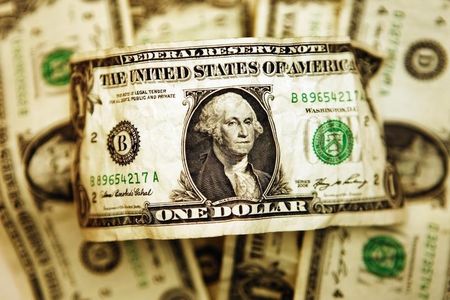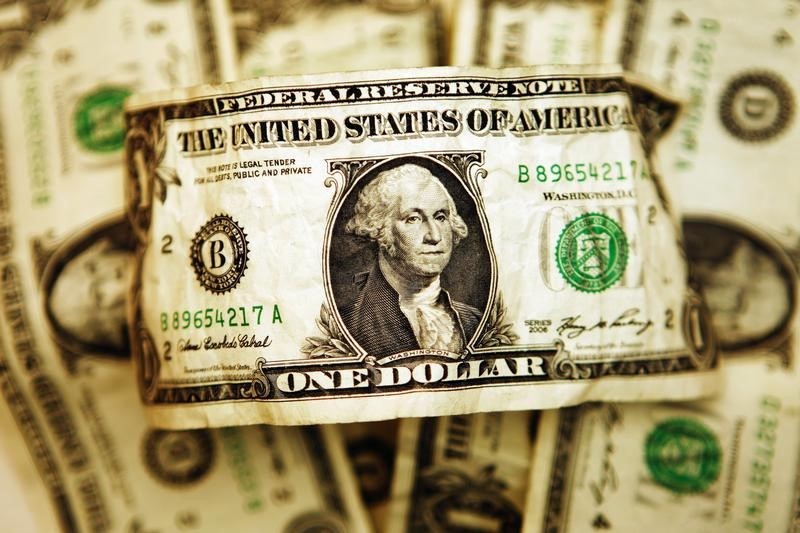
Investing.com – U.S. authorities’ decision to confiscate Russian assets may boost recent efforts to diversify the economy away from the dollar, but the dollar is likely to remain the world’s reserve currency for the foreseeable future, according to Wells Fargo.
Is the role of the dollar as a reserve currency in question?
The United States and its allies have banned transactions with Russia’s central bank and Treasury and frozen about $300 billion of Russian sovereign assets in the West following Russia’s invasion of Ukraine.
In a tougher move, the US House of Representatives late last month passed a bill allowing the Biden administration to confiscate Russian assets held in US banks and transfer them to Ukraine.
Such moves would likely lead to retaliation, with Dmitry Medvedev, a close ally of President Vladimir Putin and deputy chairman of Russia’s Security Council, saying Russia could respond to any U.S. confiscation of its foreign exchange reserves by confiscating assets, including property and foreign exchange reserves. cash, US citizens.
This will have a very limited impact on the dollar in its role as a reciprocal currency, but will likely attract China’s attention given the Asian giant’s significant dependence on the US dollar.
Concerns about the US financial outlook and Washington’s continued use of economic sanctions have already cast doubt on the dollar’s role as a global reserve currency in some capitals. Adding the risk of asset forfeiture could reinforce this thinking.
“Geopolitical tensions between the U.S. and China should theoretically prompt China to make a concerted effort to move away from the dollar and other advanced economy assets,” Wells Fargo analysts said in a May 3 note.
remove advertising
.
Measures to limit the importance of the dollar
Over the years, there have been some attempts to downplay the dollar.
These include developments such as Brazil and China announcing clearing agreements in each other’s currencies, Middle Eastern energy exporting countries willing to accept them as payment, and the possible creation of a common BRICS currency.
But Wells Fargo downplayed the moves.
Trade relations between China and Brazil account for only about 0.40% of total global trade, the US bank noted, which is nowhere near significant enough to lead to significant de-dollarization.
“We also had concerns that energy exporters in the Middle East, most of which operate under fixed exchange rate regimes against the US dollar, would be willing to potentially expose the currency peg by generating lower dollar earnings,” Wells Fargo analysts said. and the BRICS single currency, in our opinion, is unlikely to gain momentum.”
The dollar’s reserve currency status will remain
According to Wells Fargo, to be considered a “reserve currency”, it must demonstrate certain characteristics, including being freely convertible, widely accepted and used in trade and global transactions, supported by large and liquid debt markets, easily accessible to foreign investors and not subject to political influence, i.e. associated with an independent central bank.
The US dollar meets all of these criteria, and although other currencies are also associated with these characteristics, Wells Fargo believes that there are problems that will prevent the dollar from losing its status.
The euro and British pound are freely convertible, untethered and not subject to capital controls, but government debt markets are not as deep as in the US and the risks of fragmentation in the eurozone may give foreign exchange reserve managers pause.
remove advertising
.
The Japanese government bond market has been and continues to be subject to significant distortions by the Bank of Japan, and Chinese government bonds, capital controls and convertibility issues, and the managed RMB exchange rate regime should discourage reserve managers from allocating foreign exchange reserves toward Chinese assets.
“Taking these factors into account, we see limited alternatives to foreign exchange reserve managers for U.S. government bonds and, accordingly, view the U.S. dollar’s status as a global reserve currency as secure for the foreseeable future,” Wells Fargo added.
Morgan Stanley agreed, saying the dollar’s influence on the global economy remains strong across a range of economic and financial indicators, making finding a replacement challenging.
“The most talked about competitor is China, and we expect the yuan to play a somewhat more global role,” Morgan Stanley analysts said in a note last month.
“But we believe China’s ‘three-dimensional challenge’ of debt, deflation and demographics will limit the yuan’s international appeal,” MS added, estimating that yuan foreign exchange reserves should rise to just 5% in 2030 from the current 2.3% .
“We expect only a moderate and gradual decline in international use of the US dollar, given increased multipolarity and continued low diversification costs for reserve managers.”


